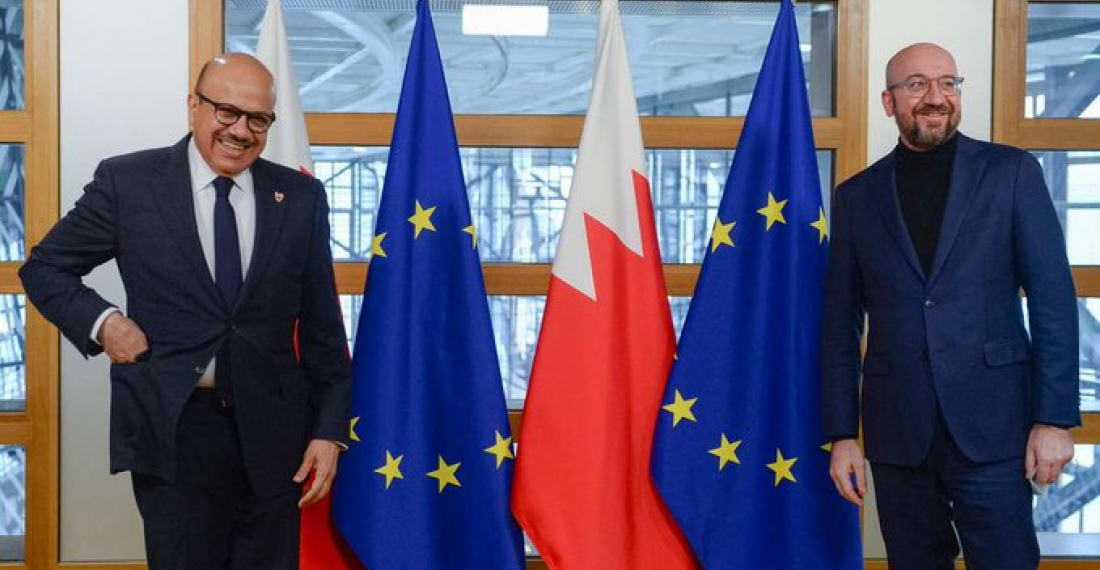A ten year moratorium on capital punishment can offer a good basis for renewed EU-GCC relations argue the commonspace.eu editorial team in this commentary. This commentary was first published in our sister publication Arabia Concise.
On 10 February the EU High Representative for Foreign and Security Policy, Josep Borrell, held a meeting in Brussels with the Bahraini foreign minister, Dr Abdullatif bin Rashid Alzayani, during which a “Cooperation Arrangement” was signed. It was a low-key affair, with Borrell’s controversial trip to Russia the week before still dominating chit-chatter over the EU’s foreign policy agenda.
The meeting was the latest in a number of small steps that indicate an increased EU interest in the Gulf region, particularly the six GCC countries – Saudi Arabia, Bahrain, Kuwait, Oman, Qatar, and the United Arab Emirates. Many EU member states have strong and long-running bilateral relations with the countries of the region, ranging from the larger member states such as France, Germany, and Italy, to the smaller ones such as the Netherlands, Malta, and Greece. Many believe that the EU’s relations with the GCC as a bloc need to be expanded, taking into account the huge transformational developments ongoing in the region itself, and a looming potential security deficit as the US refocuses its attention to the Indo-Pacific.
The document signed by Borrell with Bahrain on 10 February was described as a “Cooperation Arrangement between the European External Action Service (EEAS) and the Ministry of Foreign Affairs of the Kingdom of Bahrain” – a technical document at best. It provides “an institutional framework for political dialogue and cooperation in areas such as trade, research and innovation, clean energy and renewables.”
It is a small start and “both sides look forward to holding the first EU-Bahrain Senior Officials Meeting later this year, where possibilities of bilateral cooperation will be further explored, including in support of Bahrain’s economic diversification efforts”, an EEAS statement said. It added, “the importance of human rights in the bilateral relationship was underlined with the 5th round of the Human Rights Working Group to be held shortly offering another opportunity to engage in this field.” In Brussels, the Bahraini Foreign Minister also met with European Council president, Charles Michel (picture above).
Relations with Gulf countries tend to receive attention in the media and in the European Parliament often for the wrong reasons, namely the human rights situation which nonetheless remains problematic, and issues revolving around gender rights and the rights of foreign workers. Conversely, there is little focus on people-to-people contacts, support for reforms and societal changes in the Gulf. Diplomats like to say that quiet diplomacy works better than megaphone diplomacy. Some argue that the subtle but sustained engagement on human rights that the Commission and the EEAS appear to have adopted offers a much better approach than the more confrontational style often adopted by the European Parliament, which prefers to name and shame. However, in the context of the GCC countries, a balanced bit of both will go a long way.
The Gulf states are strategically located in the Middle East, and there is already an extensive EU-GCC security agenda that is likely to expand. The GCC countries are an important source for the EU’s energy; they are also important markets for EU trade. The EU must find a way in which it can move relations forward and help the countries as they pursue their own reform agendas whilst keeping human rights and freedoms high on its priorities – through robust dialogue if possible, and robust action if necessary.
Abolishment of the death penalty may offer an important benchmark
It may help to move the discussion about human rights in the context of EU-Gulf relations from the abstract to the tangible, and one area that could serve as a starting point is the issue of the death penalty. All six GCC countries have the death penalty on their statutes although in practice some have not used it for a long time. Saudi Arabia in the past has been the biggest culprit, but even there some progress can be seen. The state-backed Saudi Human Rights Commission recently announced that 27 executions were recorded in 2020. That is down from 184 the year before according to Amnesty International, when Saudi Arabia trailed only China and Iran globally. However, critics attribute the decline to COVID-19 rather than a change of policy. There are around 80 people currently believed to be facing the death penalty in various stages of a trial. Nonetheless, the perception of the death penalty is changing in Riyadh.
The EU should promote the idea of a moratorium on capital punishment across the GCC for a period of ten years, followed by abolition. This is a tangible benchmark to which diplomats, MEPs and activists should strive.
source: This commentary was prepared by the commonspace.eu editorial team. It was first published in our sister publication Arabia Concise on 23 February 2021.
photo: Bahraini Foreign Minister, Dr Abdullatif bin Rashid Alzayani, met with European Council president, Charles Michel in Brussels in February.







